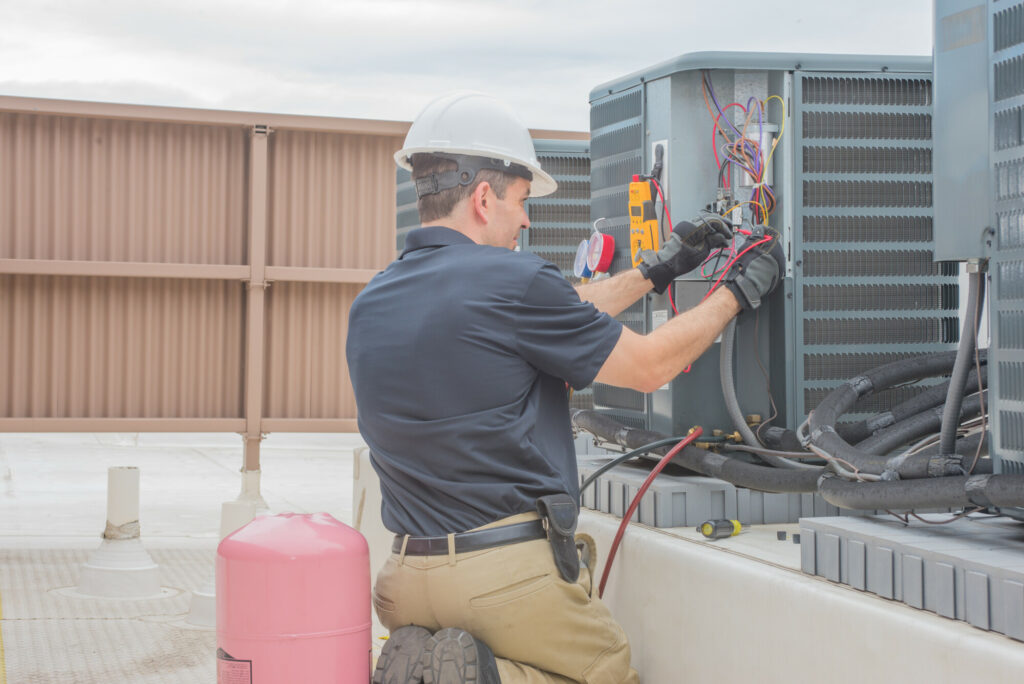
The overall HVAC systems industry’s total market value grows by around 9.9 percent every year. You would think that means they don’t last very long and need frequent replacement, right?
Well, the answer isn’t that simple. The fact is, there are a lot of other factors at play, such as maintenance, repair, inflation, and rising wages affecting that statistic.
In truth, HVAC systems can last a long time if they’re taken care of.
Your HVAC system requires ongoing care and attention as a commercial property owner or a business owner. Furthermore, a correctly constructed HVAC system will provide a pleasant atmosphere all year. Only if properly maintained.
Routine preventative maintenance will safeguard your investment. It will also extend the life of your commercial HVAC equipment. As a business owner or manager, you must plan for large-scale expenditures such as HVAC repair.
Read on below to understand how long your commercial HVAC system will endure.
What Does HVAC Stand For?
HVAC stands for heating, ventilation, and air conditioning. The HVAC system’s primary function is to maintain indoor air quality. It does so through ventilation with filtration.
HVAC is popular in residential properties such as apartments and single-family homes, hotels, senior living facilities, apartment complexes, and commercial properties such as offices, retail, industrial space, and so on in most states that endure extreme heat and cold.
What Factors Influence Commercial HVAC System Lifespan?
A large-scale commercial HVAC system is quite complicated. Commercial HVAC shares some fundamental similarities with home AC systems. But it is significantly more advanced and delivers performance far beyond what the latter can do. Generally, the lifespan of your business HVAC system is determined by a variety of factors, including:
- Installation quality
- The frequency of filter changes
- Climate and weather conditions
- Preventive maintenance frequency
- The components in the system’s quality
- The unit’s size in proportion to the building’s square footage
- The unit’s size in proportion to the duct network’s size
- The system’s design efficiency
- The efficiency and quality of the ducting
- Intensity of application
Factors Affecting HVAC System Lifespan
Commercial HVAC equipment has a life expectancy of 15 to 20 years. However, this changes with various factors.
Proper Maintenance
Proper maintenance of your business HVAC system is essential for any building to have a system that will last more than 20 years. Even the best-built systems will fail before their rated service life if they are not properly maintained.
Proper maintenance includes doing preventative care, generally conducted on a timetable. For example, the air filters in your workplace should be examined and may be updated every two months. Other preventative maintenance methods include:
- Cleaning the air ducts and exterior and internal system components.
- Replacing any damaged parts.
- Having a qualified contractor for a professional HVAC inspection at least once a year.
Outside Stressors
Climate and weather conditions are examples of outside stresses that might shorten the lifespan of commercial HVAC systems. The heat pump or air conditioner may be more affected in warmer areas. Yet, the furnace would suffer more significant wear and tear in colder climates.
In addition, the intensity of particular use, whether for hot or cold air, might alter the longevity of an HVAC system.
Inside stressors in a building can include chemicals emitted by cleaning products and outgassing from new materials such as carpets or wood. These chemicals may be causing the indoor coils, which are copper, to wear out faster.
Installation Quality
The quality of installation will influence the total longevity of your commercial HVAC system.
Ensuring that a competent and experienced HVAC specialist installs the system is critical. With the assistance of a professional installer, you can be confident that the size of the unit is adequate. This means it must be in proportion to the ductwork size and the size of the building. If not correctly considered, all of these might reduce the life of your commercial HVAC system.
To inquire more about the commercial HVAC systems, read the complete guide on Furnace Prices.
Get Quotes
How soon are you looking to buy?*



Life Expectancy Of Commercial HVAC System And Its Parts
The life expectancy of commercial heating, ventilation, and air conditioning units is never guaranteed.
Companies build commercial HVAC components to survive heavy usage, but with so many parts being fixed or replaced at a different pace, predicting how long each one will last may be challenging.
While the typical life duration of various components will vary based on the factors indicated above, the following are estimates:
- Air compressor (15 years)
- Central air conditioning (15 years)
- Electric water heater (14 years)
- Furnace (gas or oil) (18 years)
- Gas water heater (12 years)
- The heat pump (15 years)
- Rooftop air conditioning (15 years)
- Unit heaters (gas or electric) (13 years)
We recommend you contact Furnace Prices to schedule your commercial HVAC maintenance to help prolong the life span of your machinery.
What Are The Advantages Of Regular HVAC Maintenance?
With all of the day-to-day responsibilities that come with owning or managing a business, it’s easy to overlook the scheduling of commercial HVAC maintenance—but it’s important to remember that the performance and functionality of your heating and cooling equipment are critical to your organization’s success. Regular HVAC maintenance has a lot of advantages, including:
Increased Comfort – Employees and visitors feel more comfortable with consistent interior temperatures and humidity levels.
Fewer Repairs – Most small flaws are detected with regular maintenance before they cause more harm or lead to more significant, costly repairs or system failure.
Cost Savings – A clean, well-tuned HVAC system consumes less fuel and electricity, and can help you save money on your monthly energy bill. Regular maintenance may help you save money on the cost of equipment repair and replacement, in addition to minimizing your energy use.
Increased Life Expectancy – Preventive maintenance conducted on a consistent schedule throughout the year may extend the life of commercial HVAC systems by up to 20 years or more. Clean, tuned, and oiled equipment has minor wear and tear on its parts and may often last longer between repairs.
Invest in HVAC System Maintenence to Extend Its Lifespan
Investing in a new Commercial HVAC system for your business facility is a significant capital outlay. It’s essential to know the life expectancy of a business HVAC unit to precisely plan and budget for this expenditure while optimizing the return on investment. If you want to purchase a new Commercial HVAC system, check out our range or get a quote at Furnace Prices.


